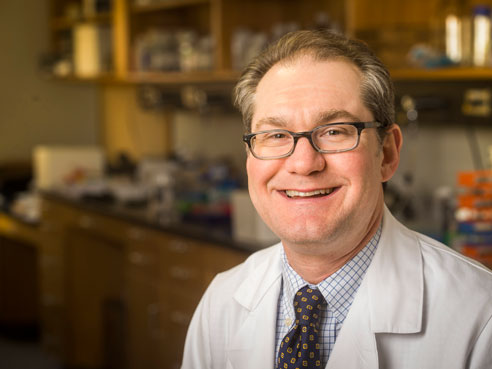 Randall Davis, M.D., professor in the UAB Division of Hematology and OncologyA University of Alabama at Birmingham physician-scientist has received a significant grant to identify antibodies, specifically targeting a protein called FCRL1, that could become a potential new treatment therapy for patients with chronic lymphocytic leukemia.
Randall Davis, M.D., professor in the UAB Division of Hematology and OncologyA University of Alabama at Birmingham physician-scientist has received a significant grant to identify antibodies, specifically targeting a protein called FCRL1, that could become a potential new treatment therapy for patients with chronic lymphocytic leukemia.
Randall Davis, M.D., professor in the UAB Division of Hematology and Oncology, has been awarded a three-year, $600,000 Translational Research Program Grant from the Leukemia & Lymphoma Society.
B cell chronic lymphocytic leukemia, commonly referred to as CLL, is the leukemia most prevalent in Western countries. According to the American Cancer Society, there will be about 18,960 new cases of CLL in the United States in 2016. The disorder is incurable by conventional therapies other than a stem cell transplant. Patients’ average age at diagnosis is about 71 years old, and most patients typically do not tolerate the aggressive treatment of a transplant well.
“We are looking for new therapies that are specific for the leukemia and are less toxic than older treatments like chemotherapy,” Davis said. “As CLL is a cancer of the immune system, CLL patients are also more susceptible to infections. So this is a major hurdle in optimizing quality of life, targeting the leukemia and avoiding life-threatening infections.”
Davis has been investigating a large family of genes he co-discovered about 15 years ago while in his fellowship at UAB. These genes encode receptors that are found on the surface of certain types of white blood cells, termed lymphocytes. B lymphocytes, or B cells, play a critical role in protecting individuals from infections and are key responders to vaccines. One of these receptors is the protein FCRL1, which is expressed by healthy B cells as well as certain malignant B cell leukemias and lymphomas.
Many research groups and pharmaceutical companies are making antibodies to target proteins on B cells and other types of cancerous cells. However, little progress has been made specifically in targeting FCRL1.
Over the years, Davis and his team have continued their work with FCRL1 and now have generated several FCRL1-specific antibodies. With this grant, they are defining and optimizing these antibodies and studying the preclinical effects of potential drugs on targeting FCRL1 in CLL.
“We hope to identify antibodies that bind strongly to the receptor and directly decrease the survival of CLL cells,” Davis said. “We will also be testing the combined impact of targeting FCRL1 along with recently FDA-approved oral drugs that inhibit critical survival pathways in CLL cells. We hope this will serve as a novel, targeted, less toxic approach to therapy for patients.”
| Boosting the body’s immune response against cancer is one most exciting advances in immunotherapy in the past couple of years, and researchers like Davis have been trying to determine the best way to kick the immune system into action. |
Boosting the body’s immune response against cancer is one most exciting advances in immunotherapy in the past couple of years, and researchers like Davis have been trying to determine the best way to kick the immune system into action.
“For us, the principal is to infuse an antibody that specifically recognizes the surface target on patients’ CLL cells,” said Davis, a senior scientist at the UAB Comprehensive Cancer Center. “Once the cells are tagged by the antibody, the immune system is harnessed to help eliminate these unwanted cells by natural defense mechanisms. This is a concept similar to the body’s recognizing and clearing an infectious microbe like a virus or bacterium.”
“I feel as though we are just getting started,” he said. “I think that identifying this family of genes unearthed a large previously unknown area of immunology that we are just scratching the surface of understanding. We have spent a lot of time developing new reagents and tools to be in a position to answer some fundamental questions about their roles in the immune system. Having a basic framework for their biology is a critical step for determining whether and how they influence disease pathogenesis and will become useful therapeutic targets in cancer and autoimmunity.”
According to Davis, “Once we identify promising therapeutic antibodies, our next step is to modify them so they are tolerated by the immune system and can be infused into patients.
“My hope is that if this becomes a successful approach in CLL, given its expression on other B cell malignancies such as non-Hodgkin’s lymphomas and other B cell leukemias, we could extend this strategy to new therapies for other related cancers as well.”